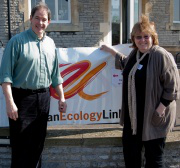Economic growth challenged at Christian Ecology Link conference

Jonathon Porritt with Ellen Teague
The current push for economic growth by politicians and financial institutions was questioned by environmentalist and keynote speaker Jonathon Porritt at Christian Ecology Link’s 30th anniversary conference in Bristol on 10 March.
“Economic growth is kept at the heart of our model of progress despite plenty of scientific evidence about the scale of environmental problems”, said Porritt, “and many believe so firmly that technology will one day solve these problems that the growth paradigm goes unchallenged”. The only growth that is sustainable is “growth that doesn’t entail destruction of the Earth’s natural capital”.
A packed audience of around 150 Christian environmental activists was urged to re-examine the notion of ‘wealth’ as meaning ‘wellness’ rather than simply ‘money’. “After 100 years of suicidal growth it is still possible to change our dire situation”, he said, “but we need to strain each sinew to do so - and call in aid every spiritual resource”.
Porritt, a Christian Ecology Link patron and Director of Forum for the Future, was speaking at St Michael’s Church in Stoke Bishop to the theme, ‘Treasure in the field: spiritual capital and sustainable living’. He told the audience that, “this community of action and reflection is very important to me as a source of inspiration”, and that Forum for the Future’s publication ‘Moving Mountains’ drew on Christian Ecology Link material.
In his book ‘Capitalism as if the world matters’, Porritt identified that besides financial capital, there is the natural capital of the mineral and biosystem resources of the earth, plus the capital of human skills and social organisation, together with the built environment, infrastructure and technology – ‘manufactured capital’. He also suggested a further crucial resource – ‘spiritual capital’. This ‘spiritual capital’, developed through a spiritual ‘renaissance’, can, in his view, help achieve true sustainability. “Today's ‘ecological crisis’ is in essence a crisis of the human spirit” he said, “for as we have degraded the earth, so we have corrupted our souls, caught up in a frenzy of suicidal consumerism”.
Porritt suggested too that social justice is a key test for sustainability, and he felt that Christians working on justice and environmental issues were building a more sustainable future. However, he also expressed disappointment that churches on the whole are too ‘other-worldly’ and fail to engage with environmental realities. “I don’t put much store in treasure in heaven” he said; “if more Christians focused on the treasure in the field rather than treasure in heaven then we would live in a very different world today”. He did single out Anglican bishop James Jones, author of ‘Jesus and the Earth’ as somebody he greatly admired.
In two responses, Tim Gorringe, Professor of Theological Studies at Exeter University endorsed the contradiction of infinite growth on a finite planet and suggested that the transition movement offers a striking alternative form of growth. He said people of faith cannot be relegated to a ‘spiritual realm’ for the whole of reality is a gift of God and there is an imperative to promote sustainable living.
Paul Bodenham, Chair of Christian Ecology Link, highlighted the way people’s desires are manipulated by the society in which we live. He felt ‘green’ Christians play an important role in helping communities reflect on sustainable development for themselves and for the wider society.
Porritt left the gathering at lunchtime to join protestors at Hinkley Point nuclear power station in Somerset, marking the first anniversary of the Fukushima disaster in Japan and calling for a halt to the building of Hinkley C, a new UK pressurised water reactor.
Meanwhile, afternoon workshops at the conference explored alternative ways of living, leading to a sustainable future. Chris Sunderland from EarthAbbey reflected on the contemplative heart of environmental activism. Jeremy Williams from Breathe suggested a radical change in our consumerist culture is vital to any hope of a sustainable future. Theologian and gardener Edward Echlin argued that small scale, biodiverse, organic food production is not only the best way food growing preserves soil and stabilises climate but is also the most productive. Mark Letcher of Climate Works explored low-carbon living in an overall context of faith. Jonathan Essex of the Greenhouse think tank asked if representative democracy could deliver sustainability, particularly when so many participatory democracy initiatives – such as the Occupy movement – have been more effective in questioning the current paradigm of development.
Christian Ecology Link’s Eco-Cell programme helps small groups work together to reduce their carbon footprints. The other three campaigns are the LOAF Food campaign, Churches in Transition and the Rainforest Campaign.
For more information see: www.christian-ecology.org.uk
















